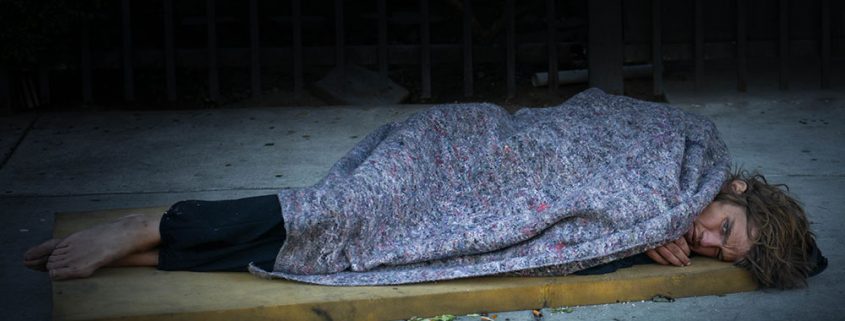USC professors participate in LA homelessness research, census
A core team of five USC professors partnered with the Los Angeles Homeless Services Authority to conduct the annual homeless count in L.A. County. This marked the first time USC was involved in the LAHSA count. More than 350 volunteers, including students and alumni, assisted in collecting the data for the three-day count in January.
Professor Benjamin Henwood from the Suzanne Dworak-Peck School of Social Work led USC’s consulting role on the initiative after the University’s provost office launched an all-school initiative to end homelessness last summer. Henwood is a co-leader of the Grand Challenge to End Homelessness through the American Academy of Social Work and Social Welfare. He partnered with professors Robynn Cox and Karen Lincoln from the School of Social Work as well as professor Jennifer Ailshire from the USC Leonard Davis School of Gerontology, to make up the core team of consultants. Cox said the multifaceted nature of the team, which comprised faculty from four different departments, was key to their success.
The results of the study, which were released earlier this month, show a 23-percent increase in the L.A. County homeless population from last year. Other notable statistics included a rise in first-time homelessness as well as a 64-percent increase in homelessness among youth and a 63-percent increase among the Latino population. Henwood also said significantly more members of the homeless population indicated having fled from violence.
“It speaks to the need of trauma-informed care when working with this population,” Henwood said. “I think there is a recognition that this is an issue that does exist and we don’t know a whole lot about.And we probably need to do more.”
Cox said the perception of homelessness being driven by substance abuse and mental health concerns is simply not true. Only 30 percent of all homeless people are reported to have a serious mental health concern, and a mere 18 percent reported to have substance abuse issues.
“To me, that seems to suggest that [substance abuse and mental health concerns are] not really what’s driving the homelessness,” Cox said. “We have to look more generally at housing insecurity and [understand] what causes people to end up in homelessness so we can catch them before they get to the most extreme form of what we would consider housing insecurity.”
Though the study does not conclude on a source of homelessness, both Henwood and Cox said they believe housing costs are a contributing factor.
“I would expect the number to go up next year too,” Henwood said. “We are as a county providing more and more housing. But at the same time I think what we’re seeing is a rental market where affordability is nonexistent.”
Henwood cites data showing a drastic increase in rent compared to the slight increase in income. Many are a paycheck away from homelessness, he said.
A 2016 pilot program estimated a homelessness prevention plan would spend $12,000 per family and $7,900 on each individual. LA County passed Measure H, allocating $40 million over the next three years for homelessness prevention, in March 2017.
Moving forward, Cox said USC will continue supporting social workers in their efforts to eradicate homelessness. A number of clinical faculty members are looking for new ways to address the issue of homelessness, and countless students are out in the field training as well.
“I think there’s a lot that we’re doing,” Henwood said. “I know that there are also a lot of resources at the University that are being pulled together to try to figure out how to form a collective impact and I think that’s still an ongoing effort.”
Correction: A previous version of this story incorrectly quoted Robynn Cox as saying researchers need to look more closely at “housing and security.” Cox was actually referring to “housing insecurity.”
This post has also been updated to clarify that homelessness caused by substance abuse and serious mental health issues is an incorrect perception, not a “stigma.”
The Daily Trojan regrets these errors.

